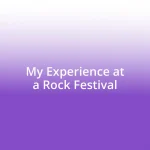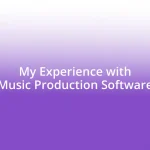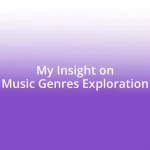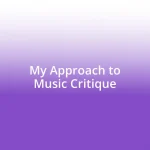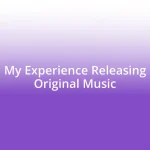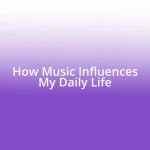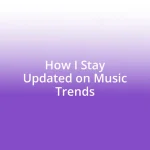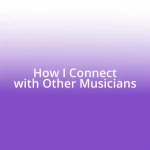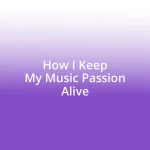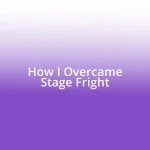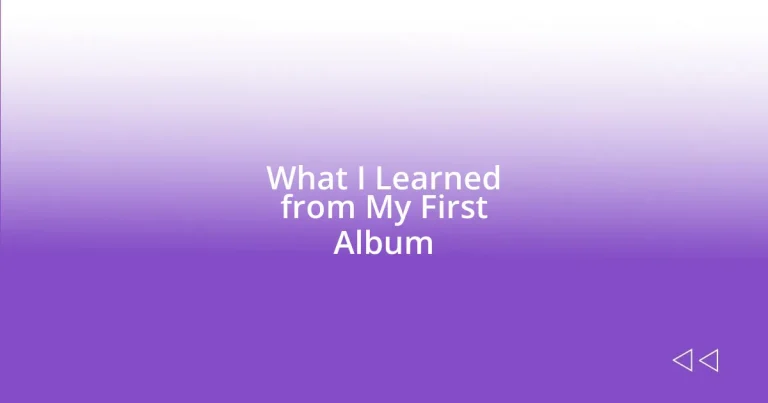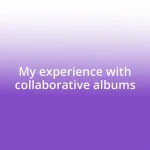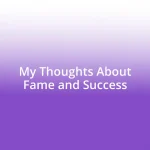Key takeaways:
- The songwriting process involves vulnerability and emotional honesty, transforming personal experiences into powerful music.
- Collaboration is essential; finding the right partners with shared vision and chemistry can enhance creativity and artistic growth.
- Marketing strategies include leveraging social media and engaging local communities to build authentic connections with the audience.
- Audience feedback is valuable for growth, guiding future projects and deepening the relationship between the artist and listeners.
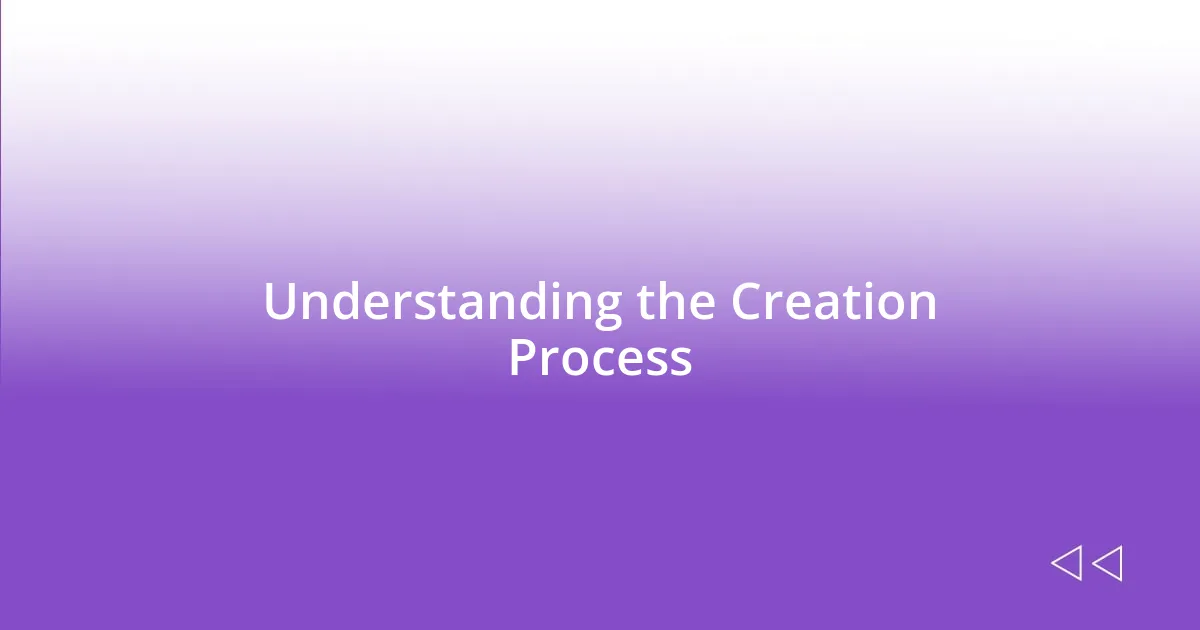
Understanding the Creation Process
Understanding the creation process behind my first album was like embarking on a thrilling adventure. Each song started as a mere spark of an idea, often emerging late at night as I jotted down thoughts in a worn-out notebook. I vividly remember pacing around my living room, guitar in hand, wondering why it felt so challenging to transform those tentative notes into something meaningful.
As I delved deeper into songwriting, I found that the creation process was also about vulnerability. I often felt exposed, sharing pieces of my heart with the world. Have you ever bared your soul to someone, hoping they’d truly understand? That’s exactly how I felt while finalizing each track. The emotional weight of those moments pushed me to pour everything into my music, transforming insecurity into raw power.
Collaboration played a crucial role in my journey as well. Working with other musicians opened up new perspectives, igniting creativity I didn’t know I had. I can still hear the laughter and joy during our jam sessions; those sounds will always resonate in my mind. It’s fascinating how sharing ideas can lead to unexpected breakthroughs. Isn’t that what makes creating art so rewarding?
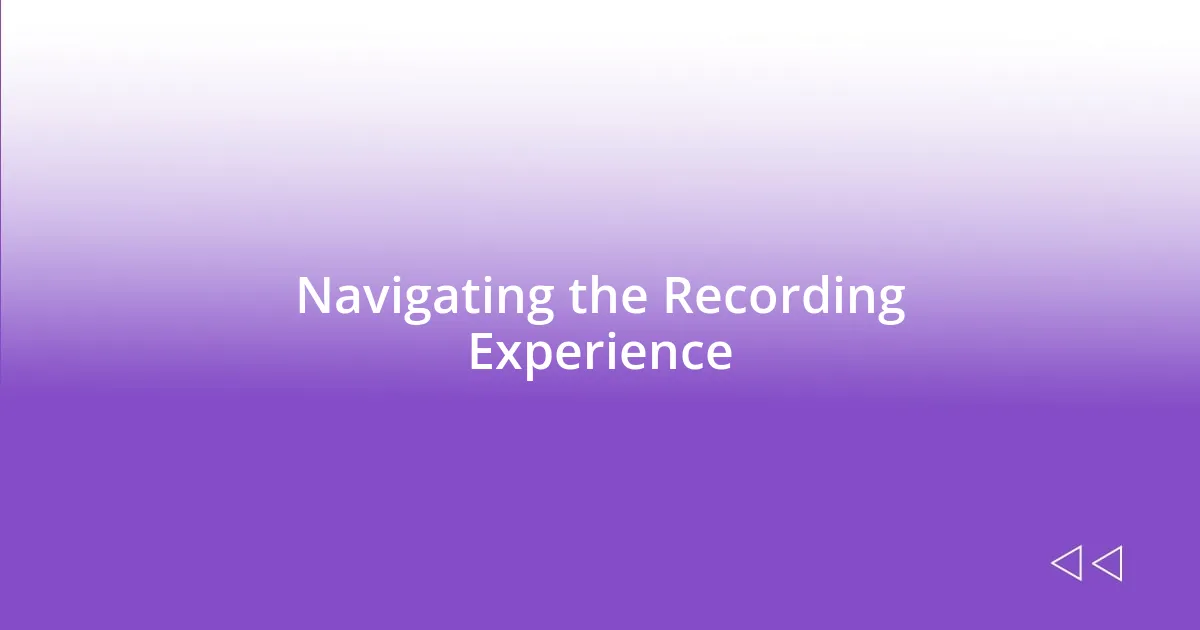
Navigating the Recording Experience
Recording my first album was an eye-opening experience filled with both excitement and challenges. On one hand, stepping into the studio for the first time felt like winning a backstage pass to my own dreams. I recall feeling a mix of anxiety and exhilaration as I watched the sound engineer tweak levels, creating a vibrant soundscape from what had started as a simple guitar riff. The moment I heard my voice played back in those pristine studio monitors, it was surreal—like hearing a secret I had kept for so long finally revealed.
Yet, navigating this new world came with its own set of hurdles. I learned quickly that communication is key, especially when collaborating with producers and musicians. Here are a few insights I gathered during the recording process:
- Trust Your Intuition: There were moments I doubted my choices, but pushing through those feelings usually led to something incredible.
- Stay Open-Minded: It’s surprising how a new idea can shift the entire feel of a song for the better. I remember a last-minute suggestion that completely transformed one of my favorite tracks.
- Set Realistic Goals: I aimed to create perfection, but I quickly realized that embracing the imperfections often yields the most authentic moments.
- Prioritize Your Vibe: I found it imperative to create an atmosphere that allowed everyone to feel at ease, which in turn fostered creativity and connection.
This journey taught me not just about music, but about collaboration and the beauty of shared vision.
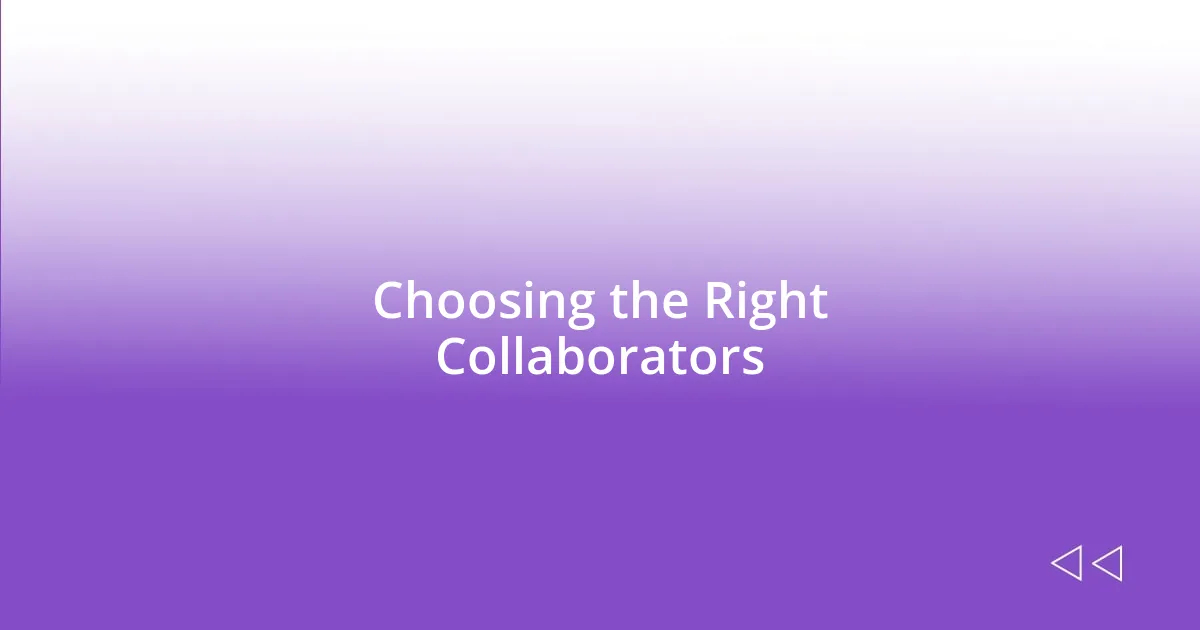
Choosing the Right Collaborators
When it came to choosing the right collaborators, I quickly realized that chemistry matters as much as talent. I vividly remember the first time I jammed with a potential co-writer. There was this unspoken connection where our ideas flowed seamlessly, like we were finishing each other’s sentences. Have you ever had that spark with someone where everything just clicks? That feeling was crucial when deciding who to work with for my album.
As I navigated my options, it became clear that aligning visions is essential. I learned the hard way that collaborating with someone who has a drastically different approach can lead to frustration. I once partnered with a musician whose style felt entirely out of sync with mine. It turned out to be a lesson in exploration but also in understanding what I really wanted for my sound. I appreciated those contrasts, but they need to complement rather than clash.
Lastly, I found value in working with people who challenge you. I remember working with a producer who pushed me to explore emotions in my lyrics that I hadn’t dared to approach before. That sense of challenge is what pushed me further as an artist. Surrounding myself with collaborators who inspire growth made the process not just rewarding but transformative.
| Criteria | Examples |
|---|---|
| Chemistry | Finding someone who resonates with your energy and ideas. |
| Shared Vision | Ensuring your artistic goals align with your collaborators. |
| Growth Potential | Collaborators who encourage risk-taking and creative exploration. |
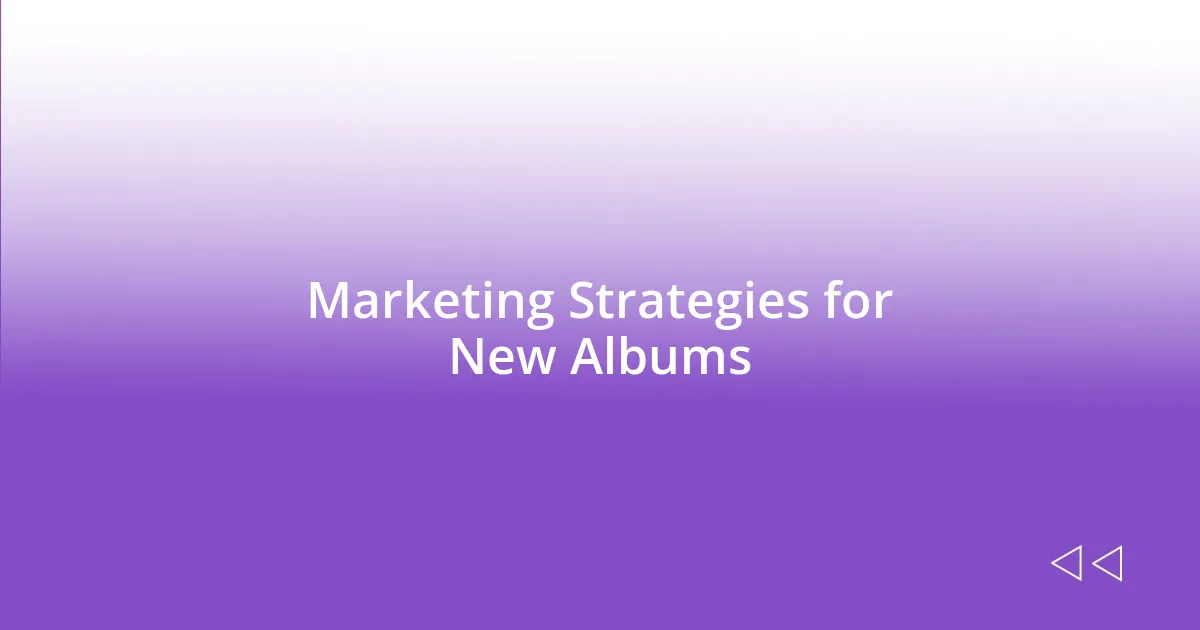
Marketing Strategies for New Albums
One of the most eye-opening marketing strategies I encountered was leveraging social media. I remember posting snippets of my songs on platforms like Instagram and TikTok before the album’s release. The excitement that built from fans’ reactions felt electrifying. It made me realize that connecting with my audience early on created a buzz that carried over when the album finally dropped. It’s amazing how a simple story or a behind-the-scenes glimpse can turn casual listeners into passionate supporters.
Another strategy that proved invaluable was engaging local communities. I organized small listening parties at local cafes, where I shared not just the music but also the stories behind it. Those intimate gatherings felt like a warm hug in a world of noise. Have you ever shared a piece of your heart and watched it resonate with others? The connections I formed during these events were authentic and reminded me that grassroots efforts can create lasting relationships—ones that are more meaningful than any ad campaign.
Finally, collaborating with influencers in my genre opened up new avenues for reach. I remember feeling a bit hesitant to approach established artists, thinking they might overlook someone new like me. But when I did, I was blown away by how willing they were to share my music with their audience. It reinforced my belief that artists truly value community over competition. Isn’t it incredible how a simple shout-out or collaboration can amplify your voice significantly in a saturated market?
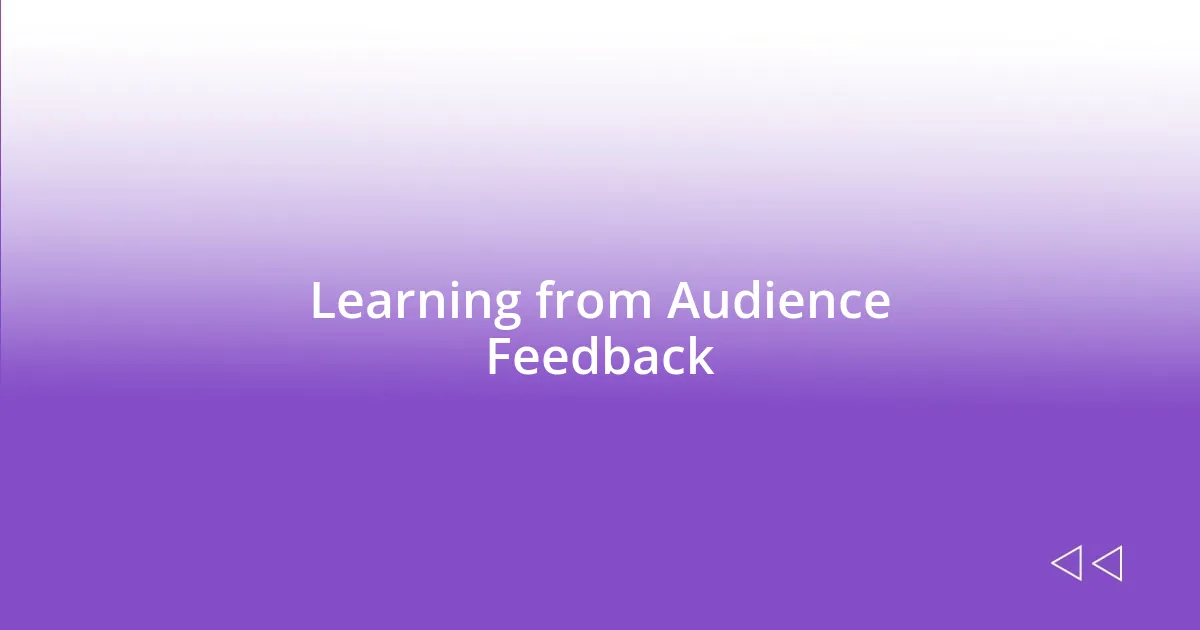
Learning from Audience Feedback
Feedback from my audience was like gold. After I released my first album, I was eager to hear what listeners thought. I remember getting flooded with messages—a mix of praise and constructive criticism. It was illuminating to see how different aspects resonated with various people. Have you ever had someone point out something in your work that you overlooked? It’s eye-opening to understand how your art is perceived, and it helps you grow as an artist.
I made it a point to pay attention to recurring themes in the feedback. While some loved the upbeat tracks, others expressed a desire for more vulnerability in my lyrics. I distinctly recall one comment that echoed in my mind: “I wish you’d share more of your story.” That pushed me to reflect on my songwriting, nudging me towards deeper emotional honesty. Isn’t it fascinating how the audience can influence your creative direction? Their insights not only shape future projects but also deepen your connection with them.
Engaging with fans on social media made the experience even richer. I held Q&A sessions where I answered questions about my songs, and it felt like we were having an intimate conversation. One fan shared that a particular song had helped them through a tough time. Hearing that made my heart swell and reminded me of the profound impact music can have. It’s moments like these that motivate me to keep evolving and connecting with my audience, ensuring that their voices are part of my creative journey.
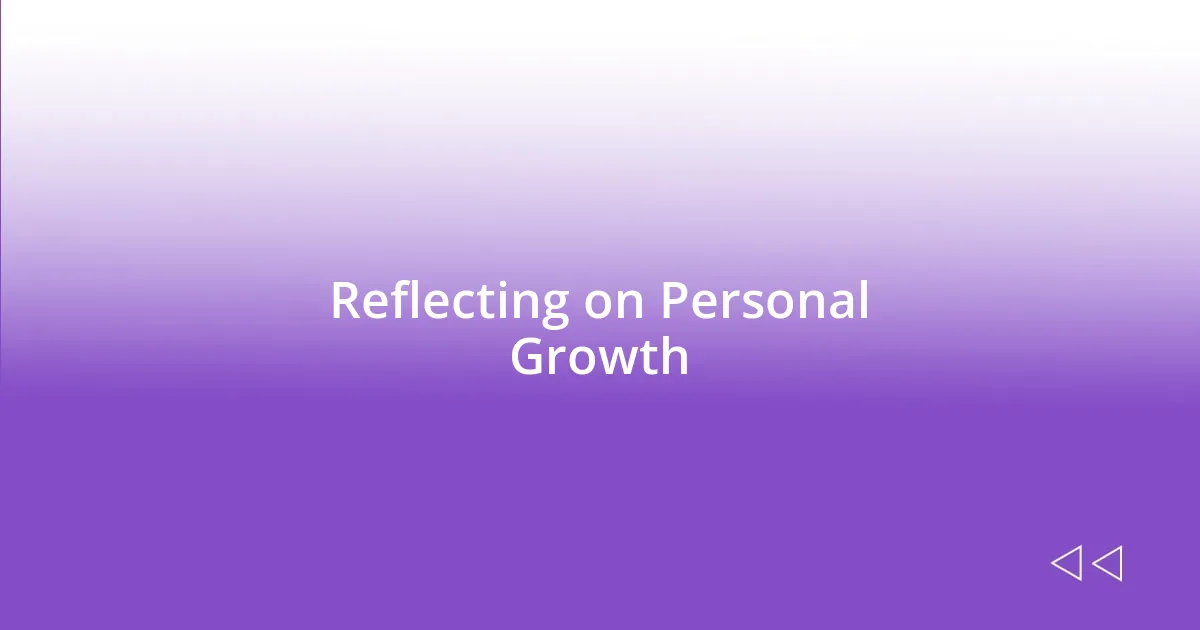
Reflecting on Personal Growth
Reflecting on my personal growth since releasing my first album feels like unraveling a tapestry of experiences. I used to see my music as a solitary endeavor, but I quickly learned that it’s a shared journey. In every note and lyric, I found a piece of myself that resonated deeply with others. It’s fascinating, isn’t it? The way our stories intertwine with listeners’ lives can redefine how we view our art.
There was one moment that stands out vividly. After a performance, a young fan approached me, her eyes shimmering with tears. She said my song helped her through a difficult breakup. That moment hit me hard. It made me realize that my music wasn’t just entertainment; it was a lifeline for some. How powerful is it to think that vulnerability can foster such connection? It pushed me to embrace my own stories fully, acknowledging that our struggles can unite us.
As I delved deeper into my songwriting, I learned the importance of authenticity. I remember sitting in my room late one night, pouring my heart into a ballad about loss. It felt raw and uncomfortable to lay my emotions bare, but the moment I shared it, something remarkable happened. People began to relate, sharing their struggles and triumphs. I discovered that by being open, I invited others into my world, and together, we navigated the complexities of life. Isn’t it incredible how growth often comes hand-in-hand with vulnerability?
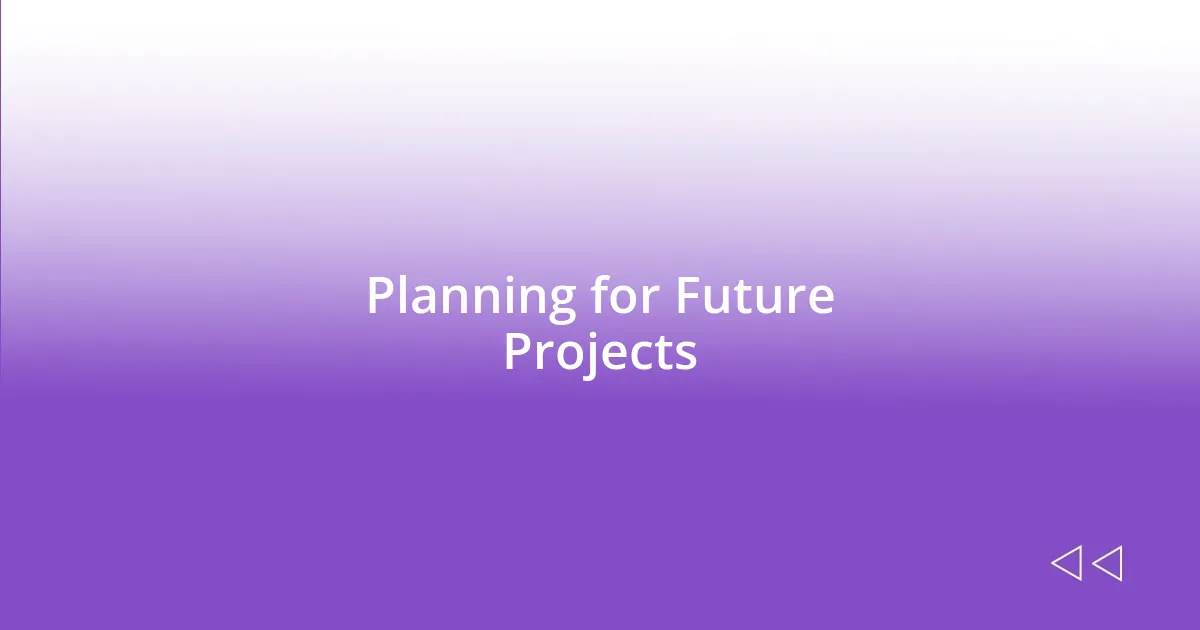
Planning for Future Projects
Planning for future projects is an exciting yet challenging endeavor. As I consider my next album, I find that organizing my thoughts and inspirations is paramount. I like to create a vision board with photos, lyrics, and even snippets of melodies that spark my creativity. Have you ever put together a collage of your goals? It really helps me visualize what I want to achieve.
I also think about collaborating with other artists, which can bring fresh energy to my music. I remember reaching out to a fellow musician after I admired their work. We ended up co-writing a track together that turned into one of my favorites. That experience taught me how teamwork can open doors I didn’t know existed. It’s thought-provoking, isn’t it? What hidden possibilities lie within simply reaching out to someone?
Lastly, setting clear timelines and milestones has become a crucial component of my planning process. I once found myself overwhelmed with ideas and ended up with a jumble of unfinished songs. After that, I began breaking my projects into manageable parts, celebrating small victories along the way. It made me realize: how you structure your creative workflow can profoundly impact your output. Do you have any strategies to stay organized in your own pursuits?
